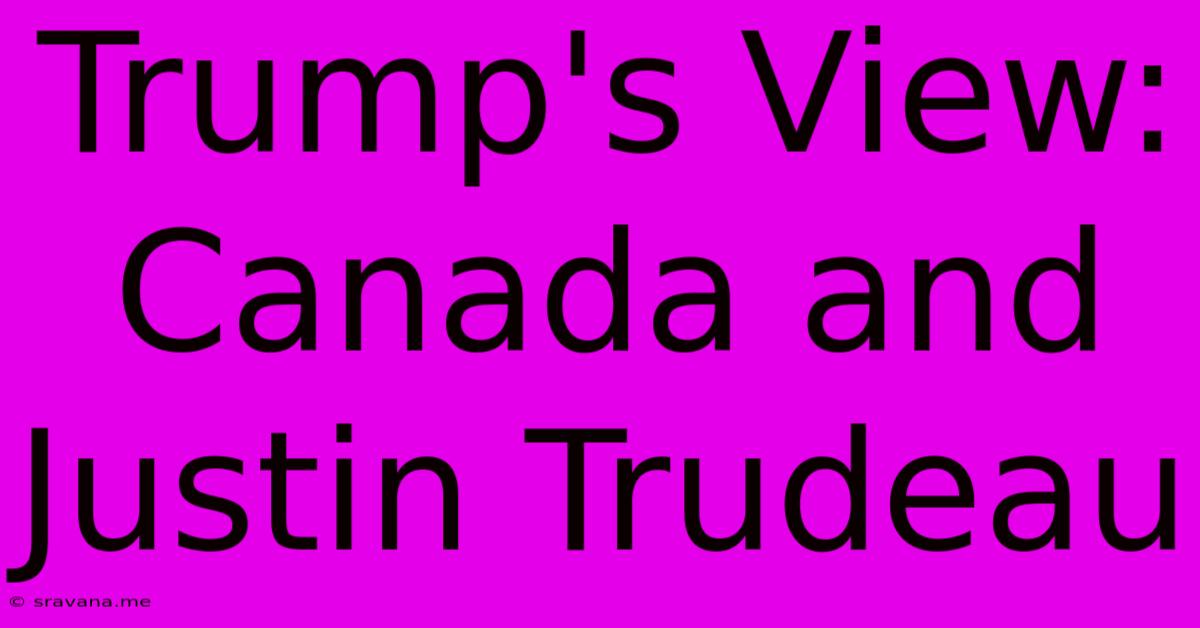Trump's View: Canada And Justin Trudeau

Discover more detailed and exciting information on our website. Click the link below to start your adventure: Visit Best Website sravana.me. Don't miss out!
Table of Contents
Trump's View: Canada and Justin Trudeau – A Complex Relationship
Donald Trump's presidency was marked by a series of unconventional foreign policy decisions, and his relationship with Canada and Prime Minister Justin Trudeau was no exception. While the two countries share a long history of close ties, including economic integration through NAFTA (now USMCA), Trump's rhetoric and actions often strained this relationship, creating uncertainty and tension. This article will delve into the complexities of Trump's views on Canada and Trudeau, exploring the underlying reasons for the friction and analyzing the long-term implications of this turbulent period.
The Foundation of Friction: Trade and Tariffs
Perhaps the most significant source of conflict between Trump and Canada centered on trade. Trump, a vocal proponent of "America First" policies, consistently criticized the North American Free Trade Agreement (NAFTA), viewing it as unfavorable to the United States. He repeatedly threatened to withdraw from NAFTA, placing immense pressure on Canada and Mexico to renegotiate the agreement.
NAFTA Renegotiation: A Tense Standoff
The renegotiation process, ultimately resulting in the United States-Mexico-Canada Agreement (USMCA), was fraught with tension. Trump frequently levied accusations against Canada, claiming they were taking advantage of the United States through unfair trade practices. He specifically targeted the Canadian dairy industry, imposing tariffs and igniting a trade war. These actions caused significant economic disruption and fueled anti-American sentiment in Canada.
Steel and Aluminum Tariffs: A Direct Confrontation
Beyond NAFTA, Trump imposed tariffs on Canadian steel and aluminum imports, citing national security concerns. This move was met with swift and strong condemnation from Trudeau and the Canadian government. Canada retaliated with its own tariffs on American goods, escalating the trade dispute. This direct confrontation showcased the fragility of the traditionally strong bilateral relationship and highlighted the unpredictable nature of Trump's trade policies.
Beyond Trade: Personality and Political Differences
The strained relationship wasn't solely about economics. Trump's personal dislike for Trudeau, evident in his public statements and interactions, added another layer of complexity. Trump often criticized Trudeau's leadership style and policies, publicly questioning his competence and integrity.
The G7 Summit Incident: A Public Showdown
The G7 summit in Quebec in 2018 became a pivotal moment in the deteriorating relationship. Following the summit, Trump publicly attacked Trudeau, accusing him of being "dishonest and weak." This unprecedented public rebuke shocked many international observers and further damaged the already fragile relationship between the two leaders. The incident underscored the deep personal animosity underlying the trade disputes.
Differing Ideological Approaches:
Beyond personal animosity, fundamental differences in political ideology contributed to the strained relationship. Trump's populist, nationalist approach clashed sharply with Trudeau's more centrist and multilateralist worldview. Trudeau's emphasis on international cooperation and climate action directly contradicted Trump's isolationist tendencies and skepticism towards climate change initiatives. These contrasting approaches made finding common ground extremely difficult.
The Impact on the US-Canada Relationship
Trump's actions left a lasting impact on the US-Canada relationship. While the USMCA ultimately replaced NAFTA, the process was marked by distrust and animosity. The trade disputes caused economic uncertainty and harmed the long-standing economic partnership between the two countries.
Long-Term Economic Consequences:
The tariffs and trade disputes led to increased costs for businesses and consumers on both sides of the border. The uncertainty surrounding trade policy discouraged investment and hindered economic growth. The long-term consequences of these disruptions are still being assessed.
Damage to Bilateral Trust:
Perhaps the most significant damage inflicted by Trump’s policies was to the deep-seated trust that had long characterized the US-Canada relationship. The repeated public attacks and unpredictable trade policies eroded confidence and created a sense of instability. Repairing this damaged trust will require sustained effort and a commitment to predictability and cooperation from both sides.
The Legacy of Trump's Approach
Trump's approach to Canada and Trudeau stands as a significant departure from the traditionally close relationship between the two nations. While some might argue that his aggressive tactics were necessary to achieve fairer trade deals, many critics contend that his actions prioritized short-term political gains over long-term economic and diplomatic stability.
Lessons Learned:
The experience of the Trump era serves as a cautionary tale regarding the importance of maintaining strong diplomatic ties and fostering trust in international relations. The unpredictable nature of Trump's foreign policy underscores the need for stability and predictability in trade negotiations and international partnerships.
Looking Ahead:
The Biden administration has sought to repair the damage inflicted during the Trump years. The renewed emphasis on multilateralism and international cooperation signals a shift away from the "America First" approach. However, the legacy of Trump's actions will likely linger, highlighting the need for sustained effort to rebuild trust and strengthen the vital US-Canada relationship. The future of this relationship will depend on a commitment to consistent and predictable policies, mutual respect, and a shared understanding of the benefits of continued cooperation. The challenges are significant, but repairing the damage caused by the Trump years is a critical task for both nations.

Thank you for visiting our website wich cover about Trump's View: Canada And Justin Trudeau. We hope the information provided has been useful to you. Feel free to contact us if you have any questions or need further assistance. See you next time and dont miss to bookmark.
Also read the following articles
| Article Title | Date |
|---|---|
| Analyzing Rams Pff Grades Seahawks Match | Jan 08, 2025 |
| Real Madrid 5 0 Minera Game Review | Jan 08, 2025 |
| Real Madrid Copa Del Rey Player Ratings | Jan 08, 2025 |
| Pff Grades Rams Perform Vs Seahawks | Jan 08, 2025 |
| Continuing Microsoft 365 Winter Graduates | Jan 08, 2025 |
